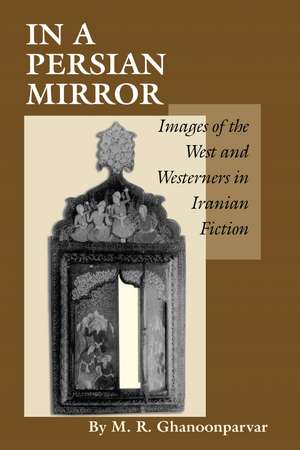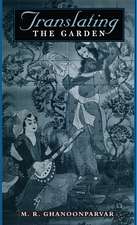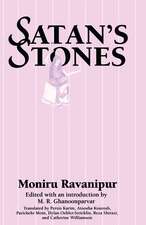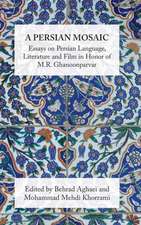In a Persian Mirror: Images of the West and Westerners in Iranian Fiction
Autor M. R. Ghanoonparvaren Limba Engleză Paperback – apr 1993
Notable among the authors whose works Ghanoonparvar discusses are Sadeq Hedayat, M. A. Jamalzadeh, Hushang Golshiri, Gholamhoseyn Sa'edi, Simin Daneshvar, Moniru Ravanipur, Sadeq Chubak, and Jalal Al-e Ahmad. This survey significantly illuminates the sources of Iranian attitudes toward the West and offers many surprising discoveries for Western readers, not least of which is the fact that Iranians have often found Westerners to be as enigmatic and incomprehensible as we have believed them to be.
Preț: 166.47 lei
Nou
Puncte Express: 250
Preț estimativ în valută:
31.86€ • 32.84$ • 26.90£
31.86€ • 32.84$ • 26.90£
Carte tipărită la comandă
Livrare economică 03-17 martie
Preluare comenzi: 021 569.72.76
Specificații
ISBN-13: 9780292727618
ISBN-10: 0292727615
Pagini: 191
Dimensiuni: 152 x 229 x 14 mm
Greutate: 0.45 kg
Ediția:New.
Editura: University of Texas Press
Colecția University of Texas Press
ISBN-10: 0292727615
Pagini: 191
Dimensiuni: 152 x 229 x 14 mm
Greutate: 0.45 kg
Ediția:New.
Editura: University of Texas Press
Colecția University of Texas Press
Notă biografică
A native of Iran, M. R. Ghanoonparvar is an assistant professor of Persian language and literature at the University of Texas at Austin.
Cuprins
- Preface and Acknowledgments
- Chapter 1: Introduction
- Chapter 2: Understanding the Unknown
- Chapter 3: The West in Contrast
- Chapter 4: The Xenophobic Impact
- Chapter 5: Split Images
- Chapter 6: Post-Revolutionary Reflections
- Chapter 7: Conclusion: On the Mirror and the Image Makers
- Notes
- Selected Bibliography
- Index
Descriere
This survey significantly illuminates the sources of Iranian attitudes toward the West and offers many surprising discoveries for Western readers, not least of which is the fact that Iranians have often found Westerners to be as enigmatic and incomprehens



















